| Srl | Item |
| 1 |
ID:
110236
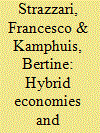

|
|
|
|
|
| Publication |
2012.
|
| Summary/Abstract |
How do informal and criminal economies transform over time, and what are the roles of armed conflict and "postconflict" intervention in this process? Based on four cases of contemporary statebuilding, this article explores the persistence and pervasiveness of extralegal economies in the face of intrusive international intervention and reflects on the implications for state formation. It observes that acting beyond the law is no prerogative of unmodern locals sitting in the antechamber of (liberally assisted) formal processes. The type of hybrid economic governance that emerges from the postconflict convergence of various levels of authority is often characterized by the selective reproduction of extralegal economic practices whose effects go well beyond the informal sector and crime boom typically registered in the immediate aftermath of violent conflicts.
|
|
|
|
|
|
|
|
|
|
|
|
|
|
|
|
| 2 |
ID:
110234
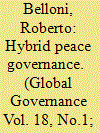

|
|
|
|
|
| Publication |
2012.
|
| Summary/Abstract |
In hybrid peace governance, liberal and illiberal norms, institutions, and actors exist alongside each other, interact, and even clash. Such a political, economic, and social order is a far cry from the liberal idea of peace based on legitimate and accountable democratic institutions, the rule of law, human rights, free media, market economy, and an open civil society. This article accounts for the emergence of hybrid peace governance and develops a typology based on the war/peace and liberal/illiberal spectra. Furthermore, it discusses the implications of hybridity and, in particular, whether it can avoid the pitfalls of top-down liberal peacebuilding and provide new opportunities for a more sustainable, locally engrained version of peace.
|
|
|
|
|
|
|
|
|
|
|
|
|
|
|
|
| 3 |
ID:
110238
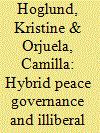

|
|
|
|
|
| Publication |
2012.
|
| Summary/Abstract |
This article analyzes hybrid peace governance and illiberal peacebuilding in postwar Sri Lanka. While discussing the kind of hybridity that has emerged, it focuses specifically on the international/domestic nexus by exploring the interplay between international intervention and domestic politics of peace governance and public mobilization. The analysis demonstrates that there are social and political divides that support the hybrid structures of peace governance. These are not merely between local and international actors; but there is also a sharp division within the international community. In this way, illiberal international powers have been gaining influence and have contributed to shaping the situation domestically. Illiberal politics are particularly justified through mobilization against the liberal peacebuilding interventions of other international powers.
|
|
|
|
|
|
|
|
|
|
|
|
|
|
|
|
| 4 |
ID:
110239
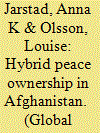

|
|
|
|
|
| Publication |
2012.
|
| Summary/Abstract |
What does local ownership actually entail in the context of an international peace operation supporting sustainable development and stability? Who should own what? Moreover, when should local ownership be introduced? Using the case of Afghanistan as a fruitful example, this article suggests that ownership is key for understanding the interactions between international and local actors as it highlights the asymmetry of this power relation. In all three types of roles that the international actors can perform-intervenor, mentor, or facilitator-such an asymmetric power relation exists. For Afghanistan, the result of the different approaches to local ownership has been a complex form of hybrid peace ownership where the international actors have become intertwined in almost all aspects of Afghan life. As the international actors are decreasing their involvement by moving from the role of intervenor to the role of mentor, the sustainability of development and stability in Afghanistan will undoubtedly be put to the test.
|
|
|
|
|
|
|
|
|
|
|
|
|
|
|
|
| 5 |
ID:
110233
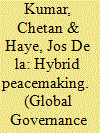

|
|
|
| 6 |
ID:
110235
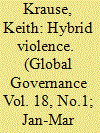

|
|
|
|
|
| Publication |
2012.
|
| Summary/Abstract |
This article unpacks the notion of hybrid violence and sketches the different forms of hybrid violence-categorical, institutional, motivational, and temporal-that can be found in many postconflict contexts. It highlights how attempts to establish a monopoly over the legitimate use of force are often at odds with the various roles that violence plays in contemporary states, especially (but not exclusively) in postconflict contexts. The article argues that in fact many of the shortcomings of the liberal peacebuilding paradigm stem from a failure to recognize that a hybrid political order existed before conflict erupted and that hybridized forms of violence were a critical element in shaping conflict dynamics in many postcolonial states.
|
|
|
|
|
|
|
|
|
|
|
|
|
|
|
|
| 7 |
ID:
110232


|
|
|
|
|
| Publication |
2012.
|
| Summary/Abstract |
GLOBALLY, 1.5 BILLION PEOPLE LIVE IN COUNTRIES AFFECTED BY VIOLENT
conflict. International aid to fragile and conflict-affected states accounts for 30
percent of global official development assistance (ODA) flows. However, no
low-income fragile or conflict-affected country has yet to achieve a single
Millennium Development Goal (MDG). For the first time, a group of these
countries have joined together to discuss their shared development challenges
and advocate for better international policies to address their needs. Calling
themselves the "g7+," this group represents an important new voice in the debate over aid effectiveness and it carries high expectations. This article describes the rise of the g7+ and attempts to answer the question on everyone's
mind: Can it deliver?
|
|
|
|
|
|
|
|
|
|
|
|
|
|
|
|
| 8 |
ID:
110237


|
|
|
|
|
| Publication |
2012.
|
| Summary/Abstract |
This article examines the transmission and reception of democratic norms in the context of liberal peace interventions. It identifies two reasons for the failure to promote democracy: the strategies favored by liberal peace actors and the agency of local elites. Drawing on field research in Lebanon and Sudan, the article argues that liberal peace projects systematically provide opportunities for local elites to overcome the apparent asymmetry of power between them and liberal peace actors. It identifies two strategies of resistance to the promotion of democracy-disengagement and recuperation- and suggests that, of the two, disengagement is more likely to produce a relapse into violence.
|
|
|
|
|
|
|
|
|
|
|
|
|
|
|
|